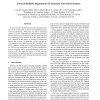Free Online Productivity Tools
i2Speak
i2Symbol
i2OCR
iTex2Img
iWeb2Print
iWeb2Shot
i2Type
iPdf2Split
iPdf2Merge
i2Bopomofo
i2Arabic
i2Style
i2Image
i2PDF
iLatex2Rtf
Sci2ools
107
click to vote
SRDS
2008
IEEE
2008
IEEE
Towards Reliable Reputations for Dynamic Networked Systems
A new generation of distributed systems and applications rely on the cooperation of diverse user populations motivated by self-interest. While they can utilize “reputation systems” to reduce selfish behaviors that disrupt or manipulate the network for personal gain, current reputations face a key challenge in large dynamic networks: vulnerability to peer collusion. In this paper, we propose to dramatically improve the accuracy of reputation systems with the use of a statistical metric that measures the “reliability” of a peer’s reputation taking into account collusion-like behavior. Trace-driven simulations on P2P network traffic show that our reliability metric drastically improves system performance. We also apply our metric to 18,000 randomly selected eBay user reputation profiles, and surprisingly discover numerous users with collusion-like behaviors worthy of additional investigation.
Distributed And Parallel Computing | EBay User Reputation | Metric | Reputation Systems | SRDS 2008 |
Related Content
| Added | 01 Jun 2010 |
| Updated | 01 Jun 2010 |
| Type | Conference |
| Year | 2008 |
| Where | SRDS |
| Authors | Gayatri Swamynathan, Ben Y. Zhao, Kevin C. Almeroth, S. Rao Jammalamadaka |
Comments (0)

